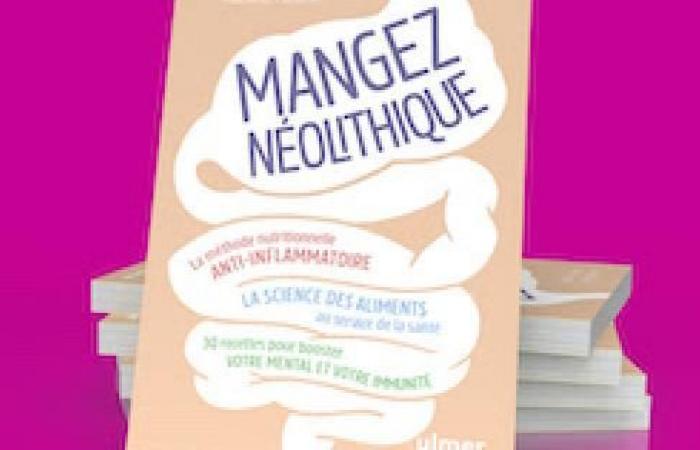Adriano Farano, baker-researcher at the origin of the Pane Vivo project and Serena Pavoni, neuroscientist interested in the brain-intestine axis and specialist in Alzheimer’s disease and nutrition, invite us to relaunch a Neolithic revolution and make Food is our best health ally. “Eat neolithic”, their book will be published on September 19 by Ulmer editions.
Faced with the explosion of diseases of civilization, Adriano Farano, journalist turned baker, and Serena Pavoni, neuroscientist specializing in nutrition, invite us to the table of the Neolithic farmer-fermenters. Together, they are developing an anti-inflammatory nutritional method scrutinized by the latest scientific studies to find the compass of eating well, improve mental health and prevent chronic diseases. This method is an original synthesis between the authentic Mediterranean diet and fermented products from other cultures, a source of health and well-being.
A bit of history to understand
Around 10,000 BC, in the Near East in the Fertile Crescent region, the nomadic hunter-gatherer settled down and discovered agriculture and livestock breeding: the Neolithic revolution had just begun. He worked the land to produce his food (cereals, legumes, plants), discovered preservation with fermentation and developed domestication. This revolution gradually spread to the rest of the planet and, by radically changing its way of life, brought humanity into a new era. With a living diet rich in plants and ferments, it made possible the transformation of Homo sapiens by developing its brain and cognitive faculties.
A method from yesterday adapted to our modern life
Vegetation of the plate, consumption of cereals (wheat, barley, rye, buckwheat, oats, etc.) and quality legumes (chickpeas, beans, lentils, etc.) as an alternative source of protein, fermented foods, low consumption of products of animal origin… the Neolithic era, by preserving the biodiversity of our microbiota and that of the environment, is becoming the new reference thanks to recent scientific and anthropological discoveries. And that’s not all ! The author duo also questions theThe potential of pre- and probiotic fermented foods. AAt the heart of the greening of the plate, ferments (bacteria of food interest) are the key to achieving a healthy and sustainable diet. Fermented foods allow us to extract nutrients such as minerals to the maximum and reduce anti-nutrients such as phytic acid or fructans.
The combination of probiotics (fermented milk kefir, water kefir, unpasteurized sauerkraut, soy sauce, miso, etc.) containing live microorganisms that reach our intestines and communicate with our indigenous bacteria and prebiotics (fibers of all kinds, small sugar chains, resistant starches from plant-based foods and fermented products) allows us to improve the health of our microbiota, regulate our immunity, protect our brain and maintain a protective biological balance. Everything you need to know about the concept of global health, the result of the latest scientific advances and WHO recommendations.
30 recipes that do you good
Veluté of beans, Amalfi anchovies, olives with ascolana, chocolate-miso cake with ginger, caramel apples… tasty recipes with low environmental impact that open up new perspectives on the use of foods and the way of combining them so that they interact synergistically. A conceptual magnifying glass will allow you to discover foods from two angles: macronutrients which allow you to learn to combine the different sources of proteins, carbohydrates and lipids and thus to compose balanced plates; micronutrients which enhance vitamins, anti-oxidant and anti-inflammatory substances.
About the authors
After a career in journalism, Adriano Farano is interested in the harmful effects of bread: high glycemic index, indigestible gluten… He decides to go in search of real wheat, that of our ancestors and founds the bakery Pane Vivo, the bread that does good. He offers in his Parisian shops an ultra-digestible bread that keeps for ten days. He teaches the management of innovative projects at Sciences-Po Paris. Author of I will not eat that bread published by Rouergue and Stale Bread: Ten Ways to Prepare It published by Épure.
After her thesis at the CEA (Université Paris Saclay) where she developed a mini-brain model to simulate Alzheimer’s disease, which was the subject of several publications in international journals, Serena Peacock then specialized in nutrition and became interested in the gut-brain axis, microbiota and fermentations by participating in several international conferences. She is responsible for Research and Nutrition at Pane Vivo. She teaches courses on carbohydrates at the Université Paris Cité for the “Nutrition & physical activity” diploma and at the Sup’Biotech school where she leads research and development projects around kefir.
Eat Neolithic by Adrianao Farrano and Serena Pavoni Ed Ulmer 224 pages, starting 19 September 2024, 19.90 and






